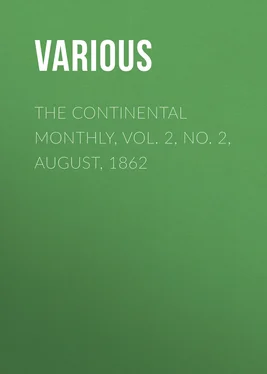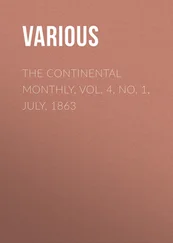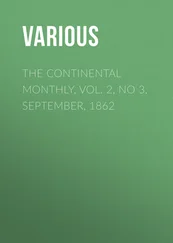Various - The Continental Monthly, Vol. 2, No. 2, August, 1862
Здесь есть возможность читать онлайн «Various - The Continental Monthly, Vol. 2, No. 2, August, 1862» — ознакомительный отрывок электронной книги совершенно бесплатно, а после прочтения отрывка купить полную версию. В некоторых случаях можно слушать аудио, скачать через торрент в формате fb2 и присутствует краткое содержание. Жанр: foreign_antique, periodic, Языкознание, Политика, foreign_edu, на английском языке. Описание произведения, (предисловие) а так же отзывы посетителей доступны на портале библиотеки ЛибКат.
- Название:The Continental Monthly, Vol. 2, No. 2, August, 1862
- Автор:
- Жанр:
- Год:неизвестен
- ISBN:нет данных
- Рейтинг книги:4 / 5. Голосов: 1
-
Избранное:Добавить в избранное
- Отзывы:
-
Ваша оценка:
- 80
- 1
- 2
- 3
- 4
- 5
The Continental Monthly, Vol. 2, No. 2, August, 1862: краткое содержание, описание и аннотация
Предлагаем к чтению аннотацию, описание, краткое содержание или предисловие (зависит от того, что написал сам автор книги «The Continental Monthly, Vol. 2, No. 2, August, 1862»). Если вы не нашли необходимую информацию о книге — напишите в комментариях, мы постараемся отыскать её.
The Continental Monthly, Vol. 2, No. 2, August, 1862 — читать онлайн ознакомительный отрывок
Ниже представлен текст книги, разбитый по страницам. Система сохранения места последней прочитанной страницы, позволяет с удобством читать онлайн бесплатно книгу «The Continental Monthly, Vol. 2, No. 2, August, 1862», без необходимости каждый раз заново искать на чём Вы остановились. Поставьте закладку, и сможете в любой момент перейти на страницу, на которой закончили чтение.
Интервал:
Закладка:
'Then it is injured by being in the ground.'
'Not much; it's jest as good fur ev'ry thing but makin' ile, puttin' it in the 'arth sort o' takes th' sap eout on it, an' th' sap's th' ile. Natur' sucks thet eout, I s'pose, ter make th' trees grow—I expec' my bones 'ill fodder 'em one on these days.'
'Rosin is put to very many uses.'
'Yes, but common's used mainly for ile and soap; th' Yankees put it inter hard yaller soap, 'case it makes it weigh, an' yer folks is up ter them doin's, and he looked at me and gave a sly laugh. I could not deny the 'hard' impeachment, and said nothing. Taking a specimen of very clear light-colored rosin from a shelf in the still-house, I asked him what that quality was worth.
'Thet ar brought seven dollars for two hundred an' eighty pounds in York, airly this yar. It's th' very best No. 1; an' it's hard ter make, 'case ef th' still gets overhet it turns it a tinge. Thet sort is run through two sieves, the coarse 'un, an' thet ar,' pointing to another wire strainer, the meshes of which were as fine as those of the flour-sieve used by housewives.
'Do your seven field-hands produce enough 'dip' to keep your still a running?'
'No, I buys th' rest uv my naboors who han't no stills; an' th' Cunnel's down on me 'case I pay 'em more'n he will; but I go on Franklin's princerpel: 'A nimble sixpence's better'n a slow shillin'. A great ole feller thet, warn't he? I've got his life.'
'And you practice on his precepts; that's the reason you've got on so well.'
'Yas, thet an' hard knocks. The best o' doctrins arn't wuth a d–n ef ye doan't work on 'em.'
'That is true.'
We shortly afterward went to the house, and there I passed several hours in conversation with my new friend and his excellent wife. The lady, after a while, showed me over the building. It was well-built, well-arranged, and had many conveniences I did not expect to find in a backwoods dwelling. She told me its timbers and covering were of well-seasoned yellow pine—which will last for centuries—and that it was built by a Yankee carpenter, whom they had ''ported' from Charleston, paying his fare, and giving him his living and two dollars and a half a day. It had cost as near as she 'cud reckon, 'bout two thousan' dollars.'
It was five o'clock, when, shaking them warmly by the hand, I bade my pleasant friends 'good-by,' and mounting my horse rode off to the Colonel's.
The family were at supper when I returned to the mansion, and, entering the room, I took my accustomed place at the table. None present seemed disposed to conversation. The little that was said was spoken in a low, subdued tone, and no allusion was made to the startling event of the day. At last the octoroon woman asked me if I had met Mrs. Barnes at the farmer's.
'Yes,' I replied, 'and I was greatly pleased with her. She seems one of those rare women who would lend grace to even the lowest station.'
'She is a rare woman; a true, sincere Christian. Every one loves her; but few know all her worth; only those do who have gone to her in sorrow and trial, as–' and her voice trembled, and her eyes moistened– 'as I have.'
And so that poor, outcast, despised, dishonored woman, scorned and cast off by all the world, had found one sympathizing, pitying friend. Truly, 'He tempers the wind to the shorn lamb.'
When the meal was over, all but Madam P– retired to the library. Tommy and I fell to reading, but the Colonel shortly rose and continued pacing up and down the apartment till the clock sounded eight. The lady then entered, and said to him:
'The negroes are ready, David; will you go, Mr. K–?'
'I think not, madam,' I replied; 'at least not now.'
I continued reading, for a time, when, tiring of the book, I laid it down, and followed them to the little burial-ground.
The grave of Sam was open, and the plantation blacks were gathered around it. In the centre of the group, and at the head of the rude coffin, the Colonel was seated, and near him the octoroon woman and her son. The old preacher was speaking.
'My chil'ren,' he said, 'she hab gone ter Him, wid har chile—gone up dar, whar dey doan't sorrer no more, whar dey doan't weep no more, whar all tears am wiped from dar eyes foreber. I knows she lay han's on harseff, and dat, my chil'ren, am whot none ob us shud do, 'case we'm de Lord's; he put us har, an' he'll take us 'way when we's fru wid our work, not afore. We hab no right ter gwo afore. Pore Juley did—but p'raps she cudn't help it. P'raps de great sorrer war so big in har heart, dat she cudn't fine rest nowhar but in de cole, dark riber. P'raps she warn't ter blame—p'raps,' and here his eyes filled—'p'raps ole Pomp war all ter blame, fur I tole har, my chil'ren'—he could say no more, and sinking down on a rude seat, he covered his face, and sobbed audibly. Even the Colonel's strong frame heaved with emotion, and not a dry eye was near. After a time the old man rose again, and with streaming eyes, and upturned face, continued:
'Dar's One up dar, my chil'ren, dat say: 'Come unter me, all ye dat am weary an' a heaby laden, an' I will gib you ress.' He, de good Lord, he say dat; an' p'raps Juley hard him say it, an' dat make har gwo.' Again his voice failed, and he sank down, weeping and moaning as if his heart would break.
A pause followed, when the Colonel rose, and aided by Jim and two other blacks, with his own hands nailed down the lid, and lowered the rude coffin into the ground. Then the earth was thrown upon it, and then the long, low chant which the negroes raise over the dead, mingling now with sobs and moans, and breaking into a strange wild wail, went up among the pines, and floating off on the still night air, echoed through the dark woods, till it sounded like music from the grave. I have been in the chamber of the dying; I have seen the young and the beautiful laid away in the earth; but I never felt the solemn awfulness of death as I did when, in the stillness and darkness of night, I listened to the wild grief of that negro group, and saw the bodies of that slave mother and her child, lowered to their everlasting rest by the side of Sam.
The morning broke bright and mellow with the rays of the winter sun, which in Carolina lends the warmth of October to the chills of January, when, with my portmanteau strapped, and my thin overcoat on my arm, I gave my last 'God bless you' to the octoroon woman, and turned my face toward home.
Jim shouted, 'All ready,' the driver cracked his whip, and we were on our way to Georgetown.
The recent rains had hardened the roads, the bridges were repaired, and we were whirled rapidly forward, and at one o'clock reached Bucksville. There we met a cordial welcome, and remained to dinner. Our host pressed us to pass the night at his house, but the Colonel had business with one of his secession friends residing down the road—my wayside acquaintance, Colonel A–, and desired to stay over night with him. At three o'clock, bidding a kindly farewell to Captain B– and his excellent family, we were again on our way.
The sun was just sinking among the western pines, when we turned into a broad avenue, lined with stately old trees, and rode up to the doorway of the rice-planter. It was a large, square, dingy old house, seated on a gentle knoll, a short half-mile from the river, along whose banks stretched the rice-fields. We entered, and were soon welcomed by its proprietor.
He received my friend warmly, and gave me a courteous greeting, remarking, when I mentioned that I was homeward bound, that it was wise to go. 'Things are very unsettled; there's no telling what a day may bring forth; feeling is running very high, and a Northern man, whatever his principles, is not safe here. By the way,' he added, 'did you not meet with some little obstruction at Conwayboro, on your way up?'
Читать дальшеИнтервал:
Закладка:
Похожие книги на «The Continental Monthly, Vol. 2, No. 2, August, 1862»
Представляем Вашему вниманию похожие книги на «The Continental Monthly, Vol. 2, No. 2, August, 1862» списком для выбора. Мы отобрали схожую по названию и смыслу литературу в надежде предоставить читателям больше вариантов отыскать новые, интересные, ещё непрочитанные произведения.
Обсуждение, отзывы о книге «The Continental Monthly, Vol. 2, No. 2, August, 1862» и просто собственные мнения читателей. Оставьте ваши комментарии, напишите, что Вы думаете о произведении, его смысле или главных героях. Укажите что конкретно понравилось, а что нет, и почему Вы так считаете.












